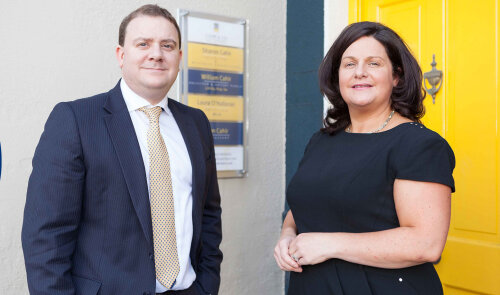Best Dangerous Product Lawyers in Ennis
Share your needs with us, get contacted by law firms.
Free. Takes 2 min.
List of the best lawyers in Ennis, Ireland
About Dangerous Product Law in Ennis, Ireland
Dangerous product law covers situations where a consumer, worker, or member of the public is harmed by a product that is defective, unsafe, or improperly labelled. In Ireland this area sits at the intersection of civil liability law, consumer protection rules, and regulatory enforcement. Key principles include the obligation on manufacturers, importers, distributors, and retailers to supply safe products and the ability of injured people to claim compensation when a product causes personal injury or property damage.
Why You May Need a Lawyer
You should consider consulting a lawyer if you have been injured, if damage was caused by a product, or if you need to protect your legal rights against a company. Common situations include:
- Serious personal injury from a defective product - fractures, burns, poisoning, or long-term disability.
- Product-related illness or allergic reaction where the cause is unclear and expert evidence is needed.
- Significant property damage caused by a faulty product - for example electrical fires or structural damage.
- Complex cases involving multiple parties - manufacturer, importer, retailer, or installer.
- Cases where the product has been subject to a recall, but the business does not accept liability or refuses compensation.
- Insurance disputes where your insurer denies or limits a claim linked to a defective product.
- Situations requiring urgent protective measures - for example preservation orders to stop a manufacturer destroying evidence.
Local Laws Overview
Key Irish laws and rules relevant to dangerous products include:
- The Liability for Defective Products Act 1991 - implements the EU Product Liability Directive and establishes producer liability for damage caused by defective products. This Act can create strict liability - meaning a claimant does not always need to prove negligence.
- The Consumer Protection Act 2007 - covers unfair commercial practices and consumer rights, and supports product safety and market surveillance.
- The Sale of Goods and Supply of Services Act 1980 - sets out basic statutory rights against sellers, including that goods must be of merchantable quality and fit for purpose.
- Health and safety legislation - workplace safety rules enforced by the Health and Safety Authority (HSA) may apply where defective equipment causes injury at work.
- Criminal and regulatory enforcement - state bodies can take action to remove dangerous products from the market, order recalls, and prosecute breaches of safety standards.
Other important practical points:
- Limitation periods - time limits apply to bring civil claims. Product liability claims commonly require action within a set period from when you knew about the injury and its cause - many claims must be started within three years of knowledge and some laws impose absolute time bars (for example a ten-year rule from putting the product into circulation) - you should confirm exact limits with a solicitor.
- Parties potentially liable include manufacturers, component makers, importers, distributors, and retailers - liability depends on the role each played in getting the product to the consumer.
- Remedies include compensation for personal injury, loss of earnings, medical costs, pain and suffering, and, in some cases, damage to private property.
Frequently Asked Questions
What counts as a dangerous or defective product?
A product is often considered defective if it does not provide the safety a person is entitled to expect. That can include a manufacturing defect, a design defect, inadequate instructions or warnings, or failure to meet regulatory safety standards.
Who can I sue if I am injured by a product bought in Ennis?
You may be able to bring a claim against the manufacturer, importer, distributor, or retailer. Identifying the correct defendant depends on who supplied the product and their legal relationship to the injury - a solicitor will help establish that chain of liability.
Do I have to prove negligence to win a product liability claim?
Under the Liability for Defective Products Act 1991 there can be strict liability for producers - meaning you do not always need to prove negligence. You must show the product was defective and that the defect caused your damage. For other claims, such as breach of contract or negligence against a retailer or installer, proof of fault may be necessary.
How long do I have to bring a claim?
Time limits apply - many product liability claims must be started within three years of when you became aware of the damage, the defect, and the identity of the producer. There are also absolute limits - for example claims may be barred if more than ten years have passed since the product was first put into circulation. Confirm the exact limitation periods with a solicitor as they can be technical.
What types of compensation can I recover?
You may be able to recover damages for personal injury - including pain and suffering, past and future loss of earnings, medical and care costs - and for damage to private property. In some cases you can also recover expenses related to the injury and loss of use of the product.
Should I keep the product that caused the injury?
Yes - preserve the product and any packaging, instructions, receipts, and warranty documents. Take photographs and do not attempt to repair or alter the item. Preserving evidence helps engineers and expert witnesses examine the product and supports any legal claim.
How do I report a dangerous product in Ireland?
Report consumer product safety concerns to the Competition and Consumer Protection Commission (CCPC). If the issue involves workplace equipment, notify the Health and Safety Authority (HSA). For food products, contact the Food Safety Authority of Ireland (FSAI). Also report serious incidents to the retailer or manufacturer and keep records of all communications.
Can I use small claims or alternative dispute resolution?
Minor monetary claims may be suitable for the small claims process in the District Court, depending on the amount involved. Consumer dispute resolution services and mediation can be effective for lower-value or straightforward cases. A solicitor can advise whether ADR is appropriate for your situation.
What if the injured person is a child?
Claims for children follow the same legal principles, but courts pay special attention to future care and long-term needs. Guardians or parents generally bring claims on behalf of minors. Time limits for children can be different in certain circumstances - seek legal advice early.
How much will a solicitor cost and can I get legal aid?
Costs vary by complexity and lawyer. Some firms offer a free initial consultation, fixed-fee options for certain tasks, or conditional fee agreements in personal injury cases. Legal aid for civil claims is limited and subject to means and merits tests - ask a solicitor about funding options, including potential contingency fee arrangements where available.
Additional Resources
Competition and Consumer Protection Commission - for reporting unsafe consumer products and consumer advice.
Health and Safety Authority - for workplace equipment and occupational safety issues.
Food Safety Authority of Ireland - for food-related safety concerns.
Citizens Information - general information on consumer rights, limitation periods, and court procedures in Ireland.
Injuries Board (Personal Injuries Assessment Board) - for assessment of certain personal injury claims and guidance on compensation processes.
Local solicitors and law firms in Ennis and County Clare - for direct, jurisdiction-specific legal representation and advice.
District and Circuit Court offices in County Clare - for procedural information on bringing civil claims locally.
Next Steps
1 - Seek medical care first - make sure any injuries are assessed and treated. Accurate medical records are essential evidence.
2 - Preserve evidence - keep the product, packaging, instructions, receipts, and take dated photographs. Record witness names and statements while memories are fresh.
3 - Report the issue - notify the retailer and manufacturer in writing, and report serious safety concerns to the CCPC or relevant regulator. Keep copies of all correspondence.
4 - Get legal advice promptly - speak to a solicitor experienced in product liability and personal injury. Early advice helps protect time-sensitive rights and can preserve evidence.
5 - Consider funding and procedure - discuss likely costs, limitation periods, and whether alternative dispute resolution or court proceedings are appropriate.
6 - Keep organised records - medical bills, payslips, receipts for expenses, and a diary of symptoms or losses will support your claim.
7 - Ask about experts - engineering, medical, and safety experts are often needed to establish defect and causation. Your solicitor can instruct appropriate experts.
Disclaimer - This guide is for general information only and does not constitute legal advice. For advice about your specific circumstances contact a qualified solicitor in Ennis or County Clare as soon as possible.
Lawzana helps you find the best lawyers and law firms in Ennis through a curated and pre-screened list of qualified legal professionals. Our platform offers rankings and detailed profiles of attorneys and law firms, allowing you to compare based on practice areas, including Dangerous Product, experience, and client feedback.
Each profile includes a description of the firm's areas of practice, client reviews, team members and partners, year of establishment, spoken languages, office locations, contact information, social media presence, and any published articles or resources. Most firms on our platform speak English and are experienced in both local and international legal matters.
Get a quote from top-rated law firms in Ennis, Ireland — quickly, securely, and without unnecessary hassle.
Disclaimer:
The information provided on this page is for general informational purposes only and does not constitute legal advice. While we strive to ensure the accuracy and relevance of the content, legal information may change over time, and interpretations of the law can vary. You should always consult with a qualified legal professional for advice specific to your situation.
We disclaim all liability for actions taken or not taken based on the content of this page. If you believe any information is incorrect or outdated, please contact us, and we will review and update it where appropriate.










